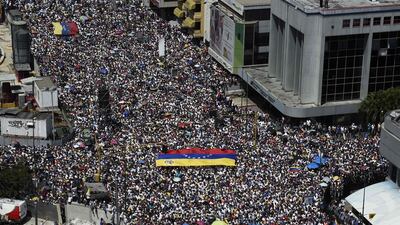It's easy to love the countries of South America. The land is so vast that geographers consider it a separate continent from North America. Politically that is not how it is seen from Washington, where at times it is treated as Uncle Sam's backyard. From Nicaragua to Argentina, the land has everything –stunning mountain scenery, breathtaking deserts, great rivers and jungles, extraordinary wildlife and the blessings of outstanding riches from natural resources. The name "Argentina" comes from the word for silver. The great River Plate – Rio del Plata – also means silver. The coast of Venezuela was so beautiful, it reminded an early explorer of Venice – Venezia in Italian, hence the name. And Venezuela is blessed with its own riches too. It claims the largest oil reserves in the world, amounting to 297 billion barrels. But if Venezuela is blessed, it also shares the Latin American curse – appalling governments, corruption and the often clumsy interest of the US.
The current crisis in what should be one of the world’s rich countries is entirely man-made. Hugo Chavez, a charismatic former paratrooper, was president of Venezuela from 1999 to 2013 and then handed his populist Bolivarian Revolution, or Chavismo, over to his far less charismatic successor Nicolas Maduro. Under Chavez, an attempt was made to do something about the gap between rich and poor but the main beneficiaries appear to have been Chavez cronies and family. His daughter Mariela Gabriela Chavez is officially a diplomat at the United Nations but she is also said to be one of the richest women in the world. Her personal fortune is estimated at $4.2 billion. This is in a country in which military officers can earn as little as $12 a month, oil production has fallen back to the levels of the 1940s, and the economy has shrunk to half of what it was at its peak. Venezuela’s hyperinflation has been put at 80,000 per cent, supermarket shelves are empty and many city dwellers are forced to scavenge for food. Venezuela’s population is 31 million but at least a million are said to have left for neighbouring Colombia in what reports claim is the biggest migration crisis in Latin American history. The legacy of Chavez and his supposed socialism is that Venezuelans have voted with their feet to leave.
This rich country is a failing state with a failed revolution, but – again in the Latin American tradition – Mr Maduro blames the US, and more specifically, the CIA. For decades Washington has interfered, sometimes brutally, in the affairs of its southern neighbours. The US invaded Panama in 1989 and overthrew the drug-running dictator, general Manuel Noriega. Washington financed or supported armed insurrections, including those in Chile in 1973, Cuba in the Bay of Pigs in 1961, and the Contras, the armed thugs who fought the Sandinista government in Nicaragua in the 1980s. But it is also true that Latin American leaders find in the CIA a convenient scapegoat for any misfortune, man-made or natural. During one of my visits to Cuba, there was an outbreak of mosquito-borne dengue fever. The Cuban authorities put up posters of giant mosquitoes which spelled out the initials “CIA” and underneath had the slogan in Spanish: “We will eradicate them”.
The simple fact about Venezuela is that financial mismanagement and endemic corruption have killed off what should be the region's most dynamic economy. Mr Maduro is clinging to power, thanks to the loyalty of a few key military officers and paramilitary supporters. But those who can be bought can also be sold. Such "loyalty" might not last long. And there is one other peculiarity about attitudes to Latin America. Senior figures on the European political left often suffer brain freeze when left-wing governments prove corrupt, cruel or incompetent. Venezuela's Maduro regime is all three and yet sections of the British Labour Party have called for an end to "the US attempt at regime change".
Recent history does suggest that Washington should resist interfering in Latin American politics. American blundering – as the Bay of Pigs and other fiascos demonstrate – tends to make things worse rather than better. And Donald Trump is hardly one to give lectures on competence in government. But the Trump administration is right to insist that ending the suffering of the Venezuelan people means ending Mr Maduro's disastrous presidency.
The more sentimental parts of the British political left often found it difficult to defend communism in the drab states of eastern Europe or in Russia. But somehow, in the sunshine, scenery and supposed socialism of Latin America, some argue it’s all the CIA’s fault. It isn’t. The best recent years for South America have been those under George W Bush and Barack Obama, when the US was preoccupied elsewhere, in Iraq and Afghanistan. And the best hope for this extraordinary continent is that its people will, by their own efforts, take control in Venezuela back from the gangsters of a failed elite who use the words “socialism” and “Chavismo” as an excuse while they fill their own pockets and bankrupt the country.
Gavin Esler is a journalist, author and television presenter


